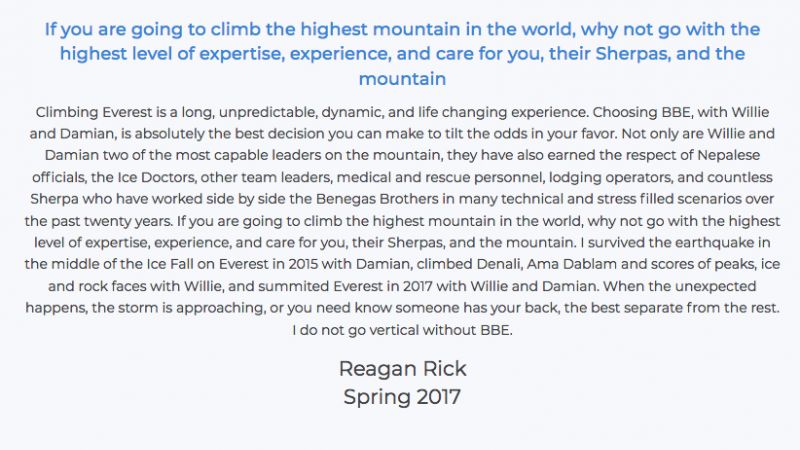WE’LL BE BACK YET AGAIN… SO WHY CLIMB WITH BBE?

Guided vs. Non-Guided Expeditions on Everest: Making the Choice, an Informed Decision!
Of course, there are endless ways to achieve any goal. That’s why, in choosing a guide service at Everest, we want our clients to review all the information, and to know how varying packages relate to summit success and safety. Here at BBE, we never cut corners. Your safety is Paramount. Because of this, we simply don’t offer Sherpa-only guided, hybrid-guided, or radio-contact-guided trips, or use inappropriately high climber-to-guide ratios. These are simply NOT the BBE style. We believe any limited-support approach strays from our cornerstone goal of providing the best and safest opportunity for you to reach the summit.
At BBE we have a 100% safety record, and firmly believe that it’s our guides that make all the difference.
Every day guiding on Everest, we are confronted with situations in which decisions must be made quickly and effectively. Something is wrong with the route, is it safe to go on? Is the anchor OK, can I fix it? It snowed last night, is it going to avalanche? The route is too crowded today, is it a long enough weather window to wait for a quieter summit day? A bad decision means life or death, and no resource – no matter how many bottles of oxygen you have, how good your weather forecast, or how quality your down suit – can take the place of being part of a team with expert judgment gained through years and years of tried and true experience. Few Climbing Sherpas in the Khumbu have the qualifications and years of accrued experience to pass BBE’s requirements for guiding on Everest.
Time and time again, we see non-guided climbers turn back due to variable weather conditions. Even those with Sherpa support frequently fail to summit due to lack of leadership from experienced guides (either Western or Sherpa); succumbing to poor decision-making and lack of planning. Even with the most generous of sponsors, few of these climbers are lucky enough to get a second chance. Furthermore, from a safety perspective, if you have just one Sherpa as your resource, the likelihood of a quick rescue with medical attention is limited. However, if your team is made up of professional Everest guides, both Western and Sherpa, and a strong support team, vital medical attention and a quick evacuation are possible. To the trauma victim, this can literally be the difference between life and death, and it’s harrowing to think of sick or injured climbers in these dangerous conditions.
The stakes are just too high to cut corners.
A paper published in the British Medical Journal states 80% of deaths on Everest occur on summit day, or shortly thereafter. Exhaustion, late summit times, and the tendency to fall behind companions are all common among non-survivors. Strong leadership skills are key when summiting Everest, and a cohesive climbing team increases safety margins on the mountain by a long, long way.
Before you climb non-guided or Sherpa-guided, ask yourself:
Do I have the experience to make flawless decisions in extreme circumstances? Only climbers with years of high altitude climbing and detailed knowledge of avalanches, route finding in bad weather, and medical and self-rescue skills have the self-care and self-management necessary to attempt a non-guided Everest summit.
This article from Outside Magazine gives some insight into guided climbs on Everest: Take A Number.
We encourage you to think carefully about your plans, and choose a service that has your best interests at heart. Here at BBE, we’re dedicated to your safety, and passionate about making your adventure an absolute success.
A Track Record of Consistent Success: BBE South Col Guided Expeditions, Spring 2010 – 2018
2018: 100% success! All guided climbers made the summit of both
Everest and Lhotse.
2017: 100% success! All guided climbers who reached high camp
made the summit.
2013: 100% success! All guided climbers who reached high camp
made the summit.
2012: Another red-letter year for Benegas Brothers Expeditions,
with six guided clients on the summit. Although we experienced
very tough summit conditions, BBE was one of the few guide
services to have large-scale summit success. Our experience and
knowledge enabled us to choose an uncrowded summit day, and
utilize our guides’ and Sherpas’ expertise. Furthermore, BBE was
paramount to the entire overall success of the 2012 Everest
season, after we opened a variation of the fixed route on the
Lhotse Face without the danger of perilous rockfall affecting the
planned route. This promptly opened up the upper face of Everest
to all climbers who summited in 2012.
2011: 100% success! A number of climbers also reached the Lhotse
summit shortly thereafter. In addition, BBE guides Damian and
Matoco successfully made one of the most difficult high altitude
rescues ever attempted, aiding a Spanish team on the Lhotse Face.
They were later awarded multiple international awards for their
efforts.
2010: 100% success! All guided climbers who reached high camp
made the summit.